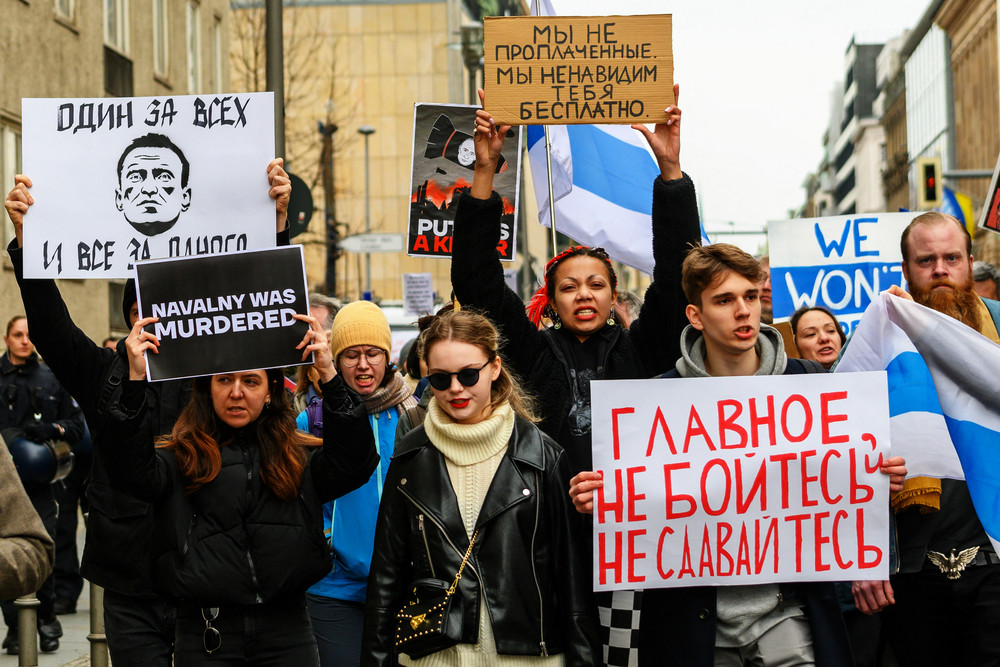 | BY GABRIEL GAVIN | | 
People hold placards in a rally on Sunday in front of the Russian embassy in Berlin following the death of Alexei Navalny. | Stefan Frank/Middle East Images/AFP via Getty Images | OUT OF OPTIONS — Lyudmila Navalnaya just wants to bury her son Alexei. The 69-year-old made the long journey to Russia’s Arctic Far North after prison officials sent her a formal notification that he had died in mysterious circumstances. But, for days, the local morgue refused to even confirm they had received Alexei Navalny’s body, before insisting it had to be held for up to two weeks for testing. On Tuesday, in an impassioned speech from outside the Polar Wolf prison where he died, Lyudmila begged President Vladimir Putin himself to let his former nemesis be laid to rest. Today, she filed a lawsuit for the release of his body . The brazen killing of the country’s best known opposition politician has shocked the world, but it only serves to underline the fact the Kremlin can murder and maim both Russians and Ukrainians alike with little fear of being held accountable. Meanwhile, the West is struggling to build consensus for further support for Kyiv, or tougher sanctions against Moscow. Russia’s war has seen the country complete its transformation into a pariah state, over which few nations now have any real leverage. More than a thousand political prisoners are currently estimated to be languishing in Russian jails, including prominent activist Vladimir Kara-Murza, a British-Russian dual national, and Wall Street Journal reporter Evan Gershkovich, detained on trumped up espionage charges for simply doing his job. Brutalizing dissidents and holding foreigners as bargaining chips is now a primary preoccupation of the legal system. At the same time, Putin has put his country on a war footing, skirting Western sanctions to significantly ramp up its ammunition and military hardware production beyond pre-war levels. And it’s paying dividends — Ukraine is sounding the alarm that it is running low on artillery shells , while Russian troops over the weekend captured the encircled city of Avdiivka, overwhelming the defenders. To top it off, the U.S. has told allies that Moscow could be working on deploying a nuclear weapon into space as early as this year. Russia is evidently on a trajectory that could upend the global order — but what can be done about it? President Joe Biden had promised “devastating” consequences if Navalny, who was previously poisoned with a nerve agent and assaulted in jail, died in Russian custody. But, he was forced to concede this week, “that was three years ago. In the meantime, they faced a hell of a lot of consequences. … They’ve made it into a position where they’ve been subjected to great sanctions across the board. And we’re contemplating what else could be done.” There are seemingly few options left on the table. Washington has already imposed unprecedented restrictions on Russian oil, gas and other exports, cutting it out of the SWIFT banking system and targeting the private wealth of Kremlin-linked officials. While the European Union, facing opposition from Moscow-friendly Hungary, stands accused of dragging its feet on a number of key measures , Brussels too is struggling to come up with new sanctions. Other possible steps, like removing Russia from its prestigious permanent seat on the United Nations Security Council , have been dropped or paused because officials see them as too technically difficult to pull off. The only obvious tool left in the box to reign in Russia’s ambitions and hit the Kremlin where it hurts is support for Ukraine — while Putin bets the house on being able to achieve a military result he can present as a victory back home. But critical aid that Kyiv needs to defend itself is being tied up on Capitol Hill, with Republican lawmakers in the House looking to block the passage of $95 billion in foreign aid that has already been approved by the Senate. And, with former President Donald Trump riding high in the polls, fears are growing that a change in White House management could give Moscow just the break it needs to finish the job. While Western leaders might be scratching their heads for ways to hold Putin and his regime to account, the pressure is on for them to come up with solutions before the consequences become catastrophic — for Ukrainians, for Russians and likely for the rest of the world as well. Welcome to POLITICO Nightly. Reach out with news, tips and ideas at nightly@politico.com . Or contact tonight’s author at ggavin@politico.eu or on X (formerly known as Twitter) at @GabrielCSGavin .
| |
| | SUBSCRIBE TO GLOBAL PLAYBOOK: Don’t miss out on POLITICO’s Global Playbook, the newsletter taking you inside pivotal discussions at the most influential gatherings in the world, including WEF in Davos, Milken Global in Beverly Hills, to UNGA in NYC and many more. Suzanne Lynch delivers the world's elite and influential moments directly to you. Stay in the global loop. SUBSCRIBE NOW . | | | | | | | — Pentagon slashes weapons programs to stay under debt deal: The Biden administration struck a deal with congressional leaders last year to limit defense spending. And at the Pentagon, the knives are out. The Defense Department plans to cut F-35 fighter jets, an attack submarine, Army helicopters and drones and Air Force overhead as it seeks to stay under the spending caps. The adjustments come as the Pentagon plans to submit a budget request next month that funds the department at just under $850 billion in fiscal 2025. — Prosecutors push to send FBI source accused of lying about Bidens back to jail: Prosecutors are asking a federal judge to reconsider a magistrate judge’s decision to free a former FBI source facing charges for falsely claiming that Joe Biden accepted a bribe from a Ukrainian businessperson. Justice Department attorneys say the former source, Alexander Smirnov, has reported extensive contacts with high-level Russian intelligence operatives and could use those alleged connections to flee justice if allowed to remain out of custody. — Head of troubled Boeing 737 MAX program leaves company: The head of Boeing’s troubled 737 MAX program — which includes the Alaska Airlines plane whose door blew off midair last month — is leaving the company, a senior Boeing official said today in a memo to employees. Katie Ringgold will succeed Ed Clark as vice president and general manager for Boeing’s 737 program as well as the Renton, Washington, factory that manufactures the planes, said Boeing Commercial Airplanes President and CEO Stan Deal.
| | LIGHT ON CASH — Donald Trump’s legendary ability to raise massive sums of political cash may be on a collision course with a new and unpleasant reality , reports the Associated Press. Campaign finance reports released this week flashed bright warning lights, showing two key committees in his political operation raised an anemic $13.8 million in January while collectively spending more than they took in. A major driver of those costs was millions of dollars in legal fees from Trump’s myriad of court cases. The latest numbers offer only a partial snapshot of the Trump operation’s finances because other branches won’t have to disclose their numbers until April. But Trump’s diminished cashflow nonetheless presents an alarming picture of the overwhelming favorite to be the GOP’s presidential nominee, particularly to would-be donors who aren’t eager to subsidize Trump’s legal challenges. CROSSOVERS — The super PAC backing Nikki Haley is encouraging South Carolina Democrats who didn’t vote in the party’s Feb. 3 primary to get involved in Saturday’s GOP presidential contest, as she seeks to close a polling gap with former President Donald Trump. A new mailer from SFA Fund Inc., which was obtained by NBC News, read: “If you did not vote in the February 3rd Democratic primary, you are eligible to vote on February 24th.” ‘EMBRYOS, TO ME, ARE BABIES’ — Former U.N. Ambassador Nikki Haley said today that frozen embryos created through in-vitro fertilization are “babies,” siding with a recent Alabama Supreme Court decision that raised concerns among doctors and patients about the future of the procedure. “Embryos, to me, are babies,” Haley told NBC News in an interview, adding that she used artificial insemination to have her son, a different process than IVF that doesn’t present the same complexities around creating embryos in a lab. “When you talk about an embryo, you are talking about, to me, that’s a life. And so I do see where that’s coming from when they talk about that.” NOT THE SAME STATE — Nikki Haley’s struggles to gain traction ahead of the South Carolina primary on Saturday stem in part from a simple demographic fact , writes the New York Times: The state that she left in 2017 to become Donald J. Trump’s first ambassador to the United Nations is not the one she is now running in for the Republican presidential nomination. South Carolina has, since 2017, had a net gain of 372,000 new residents who are old enough to vote. That means that nearly 10 percent of the current electorate did not experience Haley’s state leadership. HAPPENING TOMORROW — POLITICO’s Governors Summit convenes Thurs., Feb. 22, at Washington’s The Wharf, featuring exclusive live conversations with the leaders of six key states. As the Biden administration and Congress struggle to move legislation, America’s governors are wielding more power, advancing policy more quickly, and breaking from national party lines. Catch Playbooker Eugene Daniels interviewing Gov. Chris Sununu (R-N.H.), along with other POLITICOs sitting with Govs. Brian Kemp (R-Ga.), Kathy Hochul (D-N.Y.), Kevin Stitt (R-Okla.), Jared Polis (R-Colo.), and Bill Lee (R-Tenn.). We expect those interviews to touch on border security and migrants, energy and climate policy, health care and abortion, education and religion, even how challenges to NATO and the cease-fire movement are impacting state politics and policy. Register to join or watch live here .
| | | 
Pro-Palestinian demonstrators wave Palestinian flags and hold placards as they protest in Parliament Square in London today. | Henry Nicholls/AFP via Getty Images | FIRE OVER CEASE-FIRE — Angry members of British Parliament staged a walkout in the House of Commons this evening and vented their fury at Speaker Lindsay Hoyle, as a symbolic vote on a cease-fire between Israel and Hamas descended into chaos, reports POLITICO EU. MPs from the Scottish National Party and a raft of Conservatives walked out of the parliamentary chamber in protest at Hoyle, who they accused of tipping the scales in favor of Labour — a charge denied by Hoyle in an emotional statement. The fractious scenes came after a day of Commons intrigue over the Gaza vote. MPs had been set to vote on a motion from the Scottish National Party calling for an “immediate” cease-fire in Gaza. But Hoyle intervened to allow the opposition Labour Party — which feared a rebellion from its own MPs amid pressure over its response to the conflict — to put forward its own amendment to the motion, which also backed an “immediate humanitarian cease-fire” but included softer language on Israel’s conduct in the war. Hoyle’s move had little precedent, and was criticized on the record by the chamber’s most senior official, Clerk Tom Goldsmith. Hoyle’s intervention sparked outrage too from the ruling Conservatives, who had planned to offer their own Gaza motion but withdrew from the process in protest. YOU’RE OUT — The Guatemalan government has fired Marco Molina, a highly-respected Geneva-based official who has been leading talks for the past year on reforming the World Trade Organization’s dispute settlement system, reports POLITICO. “I was fired,” Molina confirmed in a phone interview. “Just today I was notified that I was removed from office. Well, you know, developing countries are quite complex, especially when you have unemployment. So [it was] totally unexpected. Many members are in shock. Yeah, that was not part of the plan” The move further complicates ongoing efforts to reach a deal on dispute settlement issues. However, negotiators had already given up hope of reaching agreement by next week when the WTO hosts its 13th Ministerial Conference in Abu Dhabi, United Arab Emirates. A key remaining issue has to do with restoring the review functions previously performed by the Appellate Body, which the U.S. effectively killed in 2019 by blocking the appointment of new members to the panel.
| |
| | YOUR GUIDE TO EMPIRE STATE POLITICS : From the newsroom that doesn’t sleep, POLITICO's New York Playbook is the ultimate guide for power players navigating the intricate landscape of Empire State politics. Stay ahead of the curve with the latest and most important stories from Albany, New York City and around the state, with in-depth, original reporting to stay ahead of policy trends and political developments. Subscribe now to keep up with the daily hustle and bustle of NY politics. | | | | | | | | |
| | | DEBATE ON DRUGS — Three years ago, Oregon passed Measure 110, which largely decriminalized drug use and poured millions of dollars into funding for treatment centers. At the time, it was widely praised as a compassionate approach to substance abuse issues, and it has helped many drug users find care and housing. But as the opioid crisis spikes, some local Oregon residents are turning on the law , as some argue it has contributed to open air drug use and fears of fentanyl overdose. The ongoing debate will have a significant impact on the future of drug policy and treatment across America. Katia Riddle reports for The Guardian.
| | | 
On this date in 1990: A young girl sells candies and bags of water in front of Sandinista party headquarters in Managua, Nicaragua. The headquarters was covered with political slogans promoting the candidacy of Nicaraguan President Daniel Ortega in preparation for a national election. Ortega was defeated by National Opposition Union candidate Violeta Chamorro, which led to a peaceful transfer of power in the country. | J. Scott Applewhite/AP | Correction: Tuesday’s edition of POLITICO Nightly stated incorrectly that the Biden campaign apparatus raised $42 billion in January; it was $42 million. In addition, a photo caption misidentified the year that the Friendship 7 capsule successfully orbited earth with astronaut John Glenn inside; it was 1962, not 1964. Did someone forward this email to you? Sign up here . | |
|
| | Follow us on Twitter | | | FOLLOW US | | |
| |


